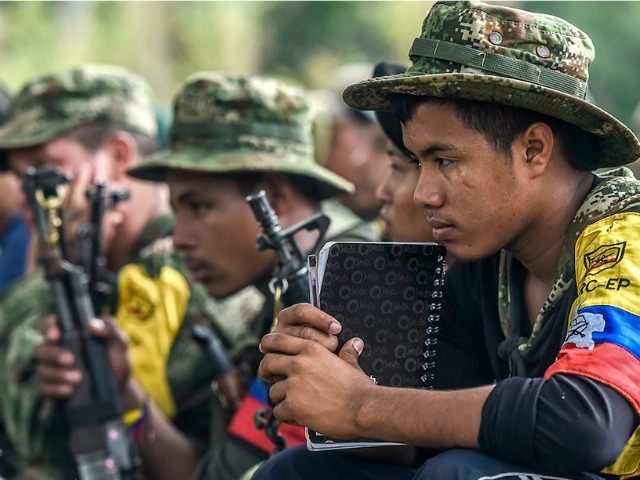Members of the Venezuelan anti-socialist opposition are warning that the peace deal with the Marxist terror group FARC in neighboring Colombia could result in a flood of absolved terrorists looking to rebuild their operation in Venezuela, a nation already bludgeoned by the world’s highest inflation rate and a severe food shortage.
While issuing a statement congratulating Colombian officials for the signing of a peace deal between Bogota and the Revolutionary Armed Forces of Colombia (FARC), the world’s wealthiest non-jihadist terror group, the head of the opposition Democratic Unity Roundtable (MUD) party Jesús Torrealba warned that Venezuelan Socialist Party officials should prepare in the event that the absolved FARC terrorists may choose a life in Venezuela over Colombia, a nation that has supported the terrorist group for nearly two decades.
“We are making a call to reflect on the consequences the signing of this agreement will bring. We celebrate that another conflict has been dismantled, but we hope it will not be handed over to Venezuela,” he said, asking of the terrorists, “Where are they going to go?”
“The likeliest case is that they will come here, where they have a compliant government that has allowed them to come and go as they please as well as take control of various zones,” he added, using a Spanish-language insult to describe the government typically reserved for a person who arranges an extramarital affair.
“They won’t be able to continue their delinquent behavior in Colombia, which might make them relocate to Venezuela,” Torrealba warned.
The FARC is a Marxist group established over 50 years ago and believed to be responsible for at least 220,000 deaths, as well as 100,000 disappearances and innumerable crimes against humanity — among them kidnappings, rape, child rape, use of child soldiers, and forced abortions.
The group has enjoyed support from the nation’s most ardently leftist governments: Venezuela, where Hugo Chávez’s successor Nicolás Maduro went as far as to welcome them for a 50th anniversary celebration; and Cuba, where the peace deal signed Monday was negotiated. Reports from those who have been victims of FARC abductions suggest that the terrorists understood Venezuela to be open to providing them safe haven in the event that they needed to flee with their hostages from Colombian officials.
Leftist propaganda outlets are praising the socialist Venezuelan government for embracing FARC. Telesur, an outlet sponsored by a number of South American governments but specializing in pro-socialist agitator pieces, alleges that Chávez “paved the way for peace” by embracing the FARC. The outlet cites Maduro, who said of his predecessor: “[Chávez] managed to build the confidence necessary to start negotiations which culminated in the signing of the peace agreement in Cartagena.”
The deal signed in Cartagena, a Colombian beach city, on Monday would allow for the government to provide amnesty for most of the nation’s 7,000 terrorists guerrillas currently hiding in the dense jungle interior of Colombia. All would have to relinquish their arms and go through a special FARC tribunal, which would find them guilty of either “political crimes” or “crimes against humanity.” It is unclear which category crimes like drug trafficking or forced abortion would fall into. Those found guilty of “political crimes” would not be eligible for prison time, instead receiving a designated community service assignment.
By 2018, the FARC will be allowed to organize as a political party. Its leaders have already said they are hoping to launch congressional candidates that year, presumably funding their campaigns with money earned through kidnap ransoms and cocaine trafficking.
Before the deal may be fully implemented, the Colombian people must vote in its favor on October 2. The deal is already signed, however, and there is no specific mechanism in place for how the government would handle a “no” vote. The “no” campaign is being led by former president Álvaro Uribe, under whose leadership the FARC was significantly diminished and forced to flee to Cuba.
Just as Torrealba is concerned Venezuela will begin to look like rural Colombia, so too is Uribe fearing that Colombia will look more like Venezuela. Citing the fact that FARC leaders will be able to run for office, he said in an interview this week, “This puts Colombia on the path to Venezuela… the impunity and political eligibility of great delinquents.” He notes that President Juan Manuel Santos “is no Chávez, but he is creating opportunities for the Chávezes to arrive.”
Uribe has called the deal “incomprehensible.” “Can you imagine Mexico granting amnesty to El Chapo Guzmán?”

COMMENTS
Please let us know if you're having issues with commenting.